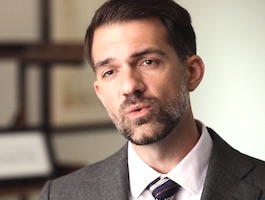Modern Psychology and Catholic Understanding part 1
- J. FRASER FIELD
I did graduate work in counselling psychology and worked in that field for a couple of years before eventually going back to university to pick up my teaching diploma.
 Cathoilc Psychologist
Cathoilc Psychologist Dr. Greg Bottaro
go here
Of course I gathered a number of useful insights during my "psychology period," but I remained largely unconvinced (one might say unconverted) by most of what I heard and saw. My dominant recollection is of how fundamental were my differences with the underlying philosophy — the assumptions about the meaning and purpose of human life and human happiness — that kept insinuating its way into the classes I took and the counselling sessions I observed.
In a nutshell, psychological counselling aims to improve the quality of people's lives by helping them focus on their own needs and then helping them find ways of satisfying those needs. Not exactly an overriding preoccupation in the life of Mother Teresa or the saints, you might say or, for that matter, not an orientation classical philosophers like Plato and Aristotle were anxious to promote.
Traditional religious wisdom urges concern for others and promotes values of self-sacrifice and self-denial, of duty and responsibility, all within a loving relationship with God and our neighbour. Much of the thinking of modern psychology pushes in a different direction. As Paul Vitz, emeritus Professor of Psychology at New York University, explains it, psychologists "inevitably promote selfishness by asking us to realize ourselves, to love ourselves, to view the environment as a means for our own self-actualizing ends, and to consider whether something will contribute to our own development as the only real criterion for what we should do."
Without intending to, much of modern psychology actively sanctions selfishness by opposing proscriptions and restraints, and by encouraging people to aim fundamentally at their own development and fulfillment. This was certainly my sense of things during my psychology years. There was not even a suggestion in any of the psychology texts we read or discussions we had in class that the cultivation of virtuous habits was in any way related to human happiness. Words like "self-denial" and "self-sacrifice" never appeared.
Yet as psychologist Robert Sollod observes, "The problems and troubles that lead people to seek psychotherapy may derive less than is commonly supposed from not expressing themselves, fulfilling themselves, or satisfying needs directed toward themselves than from not having a workable way of living in which they participate in and contribute to matters they care about beyond themselves."
The bottom line is that the dominant concern of modern psychology with "self-fulfillment", "self-actualization", has no relation to how Jesus lived, or how he instructed his followers to live. Christ commanded us, "deny yourself, take up your cross and follow me"; he did not command us to busy ourselves identifying and fulfilling our personal needs and wants. For the Christian, "the self is the problem, not the potential paradise," as Paul Vitz has observed.
Psychologists themselves haven't been completely blind to the rotten fruit that's resulted from what Paul Vitz has aptly described as their "cult of self-worship". Donald Campbell, a past president of the American Psychological Association, argued some years back that contemporary North American society is now full of "under-inhibited, overly-narcissistic and overly-selfish individuals," for which he believes psychology must take considerable blame.
Vitz and Campbell are in fundamental agreement that psychology's emphasis on the self and its fulfillment has helped promote a view of life that now leads many to see shallow, personal ego-fulfillment as an end in itself: the very meaning of their lives. I became quite captured by this whole problem during my time at university and even wrote my Master's thesis on the topic ("Anti-Religious Bias in Psychotherapy: Implications and Challenges", 1989).
But why all this talk about psychology? The simple reason is that today the assumptions and techniques of psychology have been blended seamlessly into the areas of business, families, popular entertainment, and even the courts, while psychological understandings now determine to a large extent how we define the meaning, purpose, and goals of education. We really are living in a "therapeutic age." Understanding psychology and its influence is important for people of faith.
Where to get help
Counselling can be a great help in the right context — that context being Catholic Christianity. But secular psychotherapy — divorced from or ignorant of — a proper understanding of the nature of the human person and how grace works in our lives is totally inadequate. In my experience the best place to find counselling help that integrates the most effective methods of modern psychotherapy with a deep and comprehensive Catholic understanding is the CatholicPsych Institute run by Dr. Greg Bottaro. Battaro's approach is not just baptizing a secular model with a Catholic name. It's the real goods. I've seen it myself.
Where to go to get training to be a Catholic counsellor.
The School of Counselling at Divine Mercy University in Sterling VA, is very likely the best place in North America to get the necessary training to become a Catholic counsellor.

See "Modern Psychology and Catholic Understanding part 2" here

 This is Meaghen Gonzalez, Editor of CERC. I hope you appreciated this piece. We curate these articles especially for believers like you.
This is Meaghen Gonzalez, Editor of CERC. I hope you appreciated this piece. We curate these articles especially for believers like you.
Please show your appreciation by making a $3 donation. CERC is entirely reader supported.

Acknowledgement
 J. Fraser Field. "Modern Psychology and Catholic Understanding part 1." Catholic Insight (November, 2001).
J. Fraser Field. "Modern Psychology and Catholic Understanding part 1." Catholic Insight (November, 2001).
This article was first published by Catholic Insight.
The Author
Fraser Field is the founder and publisher of the Catholic Education Resource Center.
Copyright © 2001 J. Fraser Field



